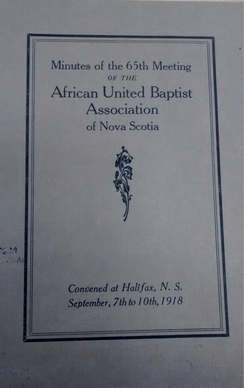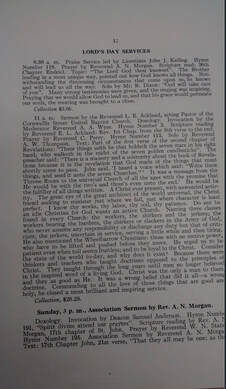|
My blog posts revolve around my interests and vocation as a historian: the intersection of history and contemporary church life, the intersection of history and contemporary politics, serendipitous discoveries in archives or on research trips, publications and research projects, upcoming conferences, and speaking engagements.
I sometimes blog for two other organizations, the Canadian Baptist Historical Society and the Centre for Post-Christendom Studies. The views expressed in these blogs represent the views of the authors, and not necessarily those of any organizations with which they are associated. |
|
Images from the archives at Acadia University. Click on image to enlarge. “Workers, Shirkers, and Jerkers” – a witty outline delivered in a Sunday morning sermon during the annual meeting of the African United Baptist Association of Nova Scotia, Halifax, NS, 7-10 September 1918. I was looking for commentary on the war effort, but this creative and witty outline captured my attention. The association met for four days and preaching played a vital part of the education and inspiration for those in attendance. The Sunday morning had two services at Cornwallis Street United Baptist Church (now New Horizons), and the sermon preached by the Rev. L. E. Ackland, acting pastor of Cornwallis, was the one with the “Workers, Shirkers, and Jerkers” comment.
But what did the expressions mean?
Churches were “for a very long and most crucial period, the most effective institution in the black community. Only the family, perhaps, was more important.”[1] Or, as the organizers of the four-day event stated, “The Colored Race in Nova Scotia has no other Institution to look up to but the Church. All our movements of uplift emanate from her, and the higher her vision and greater her foresight, the higher will the status of citizenship be for those who keep within the gunshot of her aims.”[2] Besides meeting spiritual needs, churches provided vital social links, economic assistance, and educational and leadership opportunities. And with that in mind, there was no room for shirkers or jerkers, nor wheelbarrow Christians. Workers were paramount. [1] Leo W. Bertley, Canada and Its People of African Descent (Pierrefonds: Bilongo, 1977), 135. Other important institutions were schools and press, see Robin W. Winks, The Blacks in Canada: A History (Montreal: McGill-Queen’s University Press & New Haven/London: Yale University Press, 1971). [2] African United Baptist Association of Nova Scotia, Halifax, NS, 7-10 September 1918, np.
0 Comments
Leave a Reply. |
Archives
May 2024
|


 RSS Feed
RSS Feed
